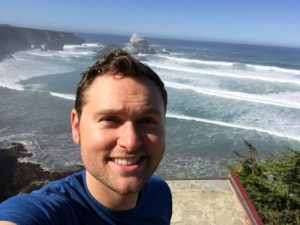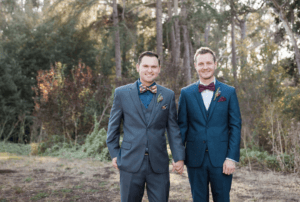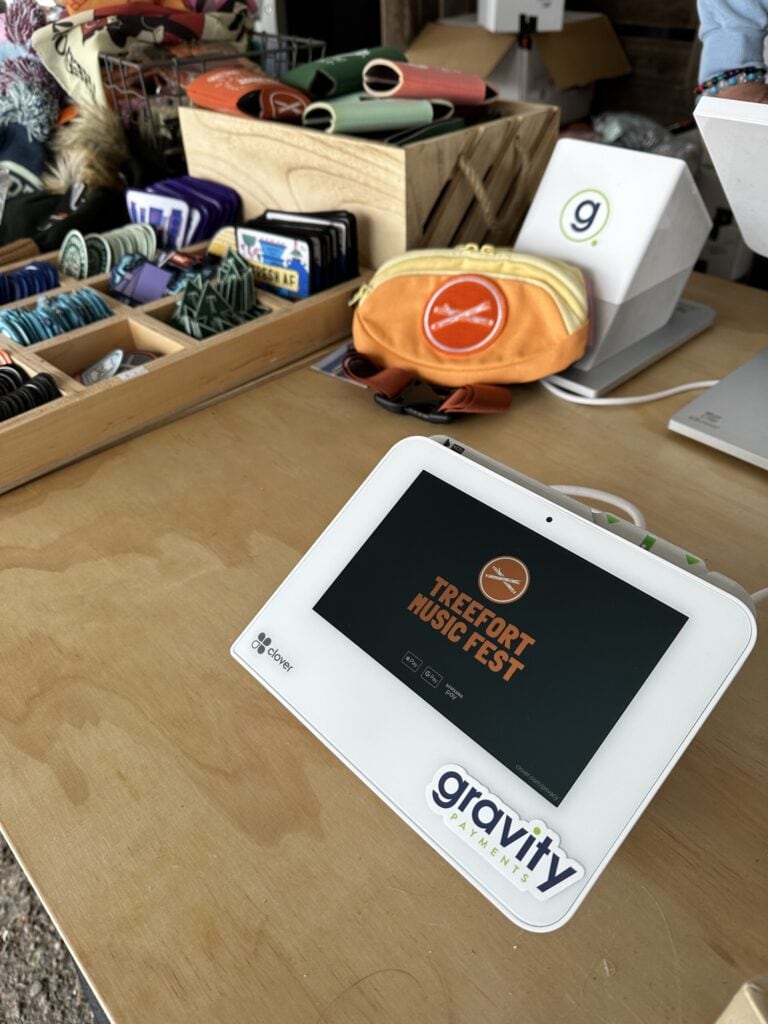
Grant on the sunny California shore.
Growing up in Santa Cruz, California, Grant MacLeod knew from an early age that he didn’t quite fit in. “I would describe Santa Cruz as a skater or surfer-bum town,” he says. “It’s very relaxed, almost like an upscale hippie town. But I was a fairly straight-laced, gay nerd, so I wasn’t like one of the other skaters, or surfers, or pot heads.”
Although he enjoyed growing up in a sunny coastal town where he could walk to the beach from a trail behind his mom’s house, most of Grant’s hobbies kept him indoors. A self-described gamer nerd, young Grant passed many hours playing Everquest or coding in his school’s computer lab. “After three semesters of computer class in middle school, I just wanted to keep taking it,” he says. “So I took it as an elective, basically serving as a TA and helping people with their assignments. When they were done, there was this little program you could code in and kind of do whatever you wanted. You could do things like make mazes by programming different colors to do different things or make your character image bounce or slow down or move to a different location on the screen, all sorts of fun stuff like that.”
Looking back, it seems obvious that Grant would eventually end up working in software technology, but to hear him tell the story, it seems his career was almost accidental. A decade before he joined Gravity as a Product Manager in July 2018, Grant studied biology at the University of California, Davis. He chose the school because he came from a proud UC family (his mom attended UC San Francisco and his dad attended UC Santa Cruz), and Davis offered a bachelor’s degree in genetics, which intrigued him. Although he didn’t know what type of career he might pursue, he chose genetics because he’d long been fascinated by science. “As a kid, I was always interested in, kind of like, pseudo-chemistry stuff,” he says. “I would mix chemicals together–I’m sure it was very dangerous–and so I always kind of had that mad-scientist interest.”
Get the Gravity newsletter for the latest FAQs, tools, tips and tricks
His mad-scientist side blossomed under his high-school biology teacher Gail Alaimo, whom he credits with making everything about biology exciting and interesting. He was so enthralled by her class that he took chemistry at his local community college that summer just so he could take AP Bio the following year. In that class, Grant was able to witness the amazing power of genetics through experiments like using jellyfish genes to make bacteria glow. “It was just like magic made real,” he says. “It was just so cool, and I wanted to get more into that.”
After college, Grant moved back to Santa Cruz to live with his boyfriend (now husband) Matt, whom he had started dating the year before. The two had gone to the same high school, but because Matt was a few years older, they never met until mutual friends introduced them. They immediately hit it off and dated long distance while Grant finished his degree.
Unfortunately, when Grant graduated in the Spring of 2009, that degree proved to be of little use in entering the job market. The recession was in full swing, and it wasn’t just English majors who were having trouble finding work. “Our commencement speech at graduation was basically like, ‘Good luck.’” Grant says, reflecting on how he hadn’t been paying much attention to the recession until that moment. “It was not inspiring, it was just depressing.”

Grant, back when he wore glasses
Unable to find work in a laboratory, Grant took a job selling computers at a local Best Buy. Although he weathered the rest of the recession with his job intact, the experience was largely demoralizing. “I felt over qualified with a bachelor’s degree, but it was really hard to get a job in my field, and it wasn’t easy working at Best Buy,” he says. “There was kind of like this waterfall of blame. The general manager might get a call from the district manager saying that our sales didn’t hit something, and he talked to all of his managers, and then those managers talked to all the supervisors, and all the supervisors talked to all the floor employees. So you end up with this twelve-dollar-an-hour employee being told that it is up to them to turn the entire company around by selling three more computers and service plans that day. And you just feel completely powerless and awful.”
In April 2011, Grant finally found a part-time position in the lab at Santa Cruz Biotechnology, a producer of antibodies and reseller of lab equipment, chemicals, and other biotech supplies. His job was to grow and cultivate genetically modified cells and lyse them for experiment supplies that could then be sold to third-party researchers and companies. Although the work was far more enjoyable than retail, Grant admits to being let down by the reality of the lab environment. “It turns out working in a biotech lab is still doing the same thing every day,” he says. “We would always get excited when a procedure wasn’t working right. It was kind of like, ‘Oh, we should isolate which variable it is and go through the scientific process to see what the issue is here.’ And our managers would say, ‘Nope, don’t worry about it, just keep doing the same thing, and eventually it will go away. The problem will fix itself.’ They were usually right, but it was the opposite of what you want to hear when you are finally in a lab and you want to do scientist things.”
Grant tried to get a full-time position in the lab, but when it became clear that wasn’t an option, he moved to the licensing department as a chemical products specialist. In his new role, Grant managed the chemical product line the company sold, kept track of safety information and specifications, and negotiated with vendors. Although it wasn’t the job he necessarily expected when he got his degree, the role gave him the opportunity to do two extremely important things for his career: 1) quit Best Buy, which he did in November 2011 (“I basically refused to work another Black Friday,” he says.) and 2) learn the skills that would ultimately shape the career he has today.
As part of his role in the licensing department, Grant helped manage the huge operational database that stored information on various products and orders. As he interacted more and more with the technology, he became fascinated by how it worked and began brainstorming ways to make it more efficient. The IT department was too busy to dedicate time to the database, so Grant decided to learn the skills himself. He started taking coding classes at the same community college he’d attended during high school and quickly earned the credentials to improve the database. He also rediscovered his childhood passion for coding. “I freaking loved it,” he says. “It was so cool. I could just find out what needed to be done and start problem solving. This was the first time that I would look up and realize I had stayed late by accident because I was so absorbed in fixing the problem.”
About two years into his tenure at Santa Cruz Biotech, Grant moved into a managerial role in his department and became the department lead. As he expanded his skills and knowledge, his co-workers came to see him as an expert on pretty much all facets of the department processes, which made him something of an unofficial leader at the company. Clearly, having the skills to operate and improve a piece of technology on which many people rely to do their jobs was a surefire path to credibility and respect. It didn’t hurt that Grant found the work incredibly fun.
Unfortunately, given the way the company was structured, Grant knew his opportunities to advance were limited. If he wanted to move forward in his career, he’d need to move on from Santa Cruz Biotech.
In the Spring of 2015, a former co-worker reached out to Grant about an opportunity at Stanford University. Except for the hellish commute (typically three hours round-trip in traffic from Santa Cruz), the job was a perfect fit for Grant and involved him overseeing the development and licensing of the university’s intellectual property. He joined Stanford that May.
By this point, Grant was, as he puts it, “addicted” to working with databases, and he quickly became an expert in the proprietary database his office used. When the full-time database manager quit, Grant took over her responsibilities in addition to his own. As if his plate weren’t full enough, he also started a remote master’s program in information technology at Virginia Tech. “I just tried to sit down and think about what I liked about my work the most, and it always came back to technology software, the database, managing the database, doing the project management around that,” Grant says of his decision to pursue his master’s degree. “Asking people what they liked about the database, how it could be better for them–all of that had been my favorite thing at Santa Cruz Biotech and at Stanford.”

Grant and Matt on their wedding day
A few months after he started working at Stanford, Grant married Matt at, of all places, the community college where Grant had taken his first coding classes. They eventually moved to Campbell, California, to reduce Grant’s commute time, but as they started thinking about the future, they began considering the long-term viability of living in Silicon Valley. The average home price in the area had reached $1 million, and Grant and Matt didn’t feel the cost of living was worth the quality of life. Matt had spent some of his childhood in Washington State, and Grant had enjoyed the time he had spent visiting the Pacific Northwest. They began considering moving to the area and initially set their sights on Portland.
Around this time, Grant reached out to Jen Peck, a friend of a friend who had become a mentor of sorts to Grant as he’d developed his technology career. Jen had worked in the Seattle tech industry for several years, so Grant asked if she had any contacts in Portland who’d be open to talking to him. Jen said she’d introduce him to some people in Portland on the condition that he apply to at least one job in Seattle.
Jen had recently been hired as Gravity’s Director of Engineering and was actively looking to grow the development team there. As she and Grant continued to chat about his career prospects in the area, she mentioned she was looking for a product manager. Although Grant had no previous experience in finance or payments, the responsibilities of the role lined up perfectly with what he had done in biotech and licensing. When Jen reviewed his resume and credentials, she offered him an interview.
Grant joined Gravity in July 2018 and has since been using his technology knowledge to help the engineering team build and deliver products for Gravity’s merchants and partners. It’s a job that requires relatively little coding and a lot of curiosity. Why are we making what we’re making? What are the customer needs? Why do they think that they need what they think they need? Is that really what they need? What do our competitors offer? These are just some of the questions Grant asks in an effort to help keep the team focused and on track.
Grant speaks with such infectious enthusiasm about software development that even a technology neophyte starts to understand why a career like his would be so appealing. “I love that there’s nothing you can’t do with software,” Grant says. “Everything is software now. So when I was getting into software, I never thought I would get into payment processing because I didn’t think about all the software involved when you’re running your credit card. But it’s everywhere, it’s everything. And being a part of that, and learning all about that, is just fascinating. When you are coding, or scripting, or whatever, it’s so nice to be able to problem solve. And then the end result, you see it working. I did this, it’s working. It’s just, a great feeling of accomplishment.”
Written by Brooke Carey, Content Editor
Humans of Gravity is a profile series designed to highlight the unique individuals who comprise our team. Gravity Payments believes in celebrating our shared humanity by letting employees bring their full selves to work. Interested in joining this amazing group of people? Check out our Careers page for the latest opportunities.



